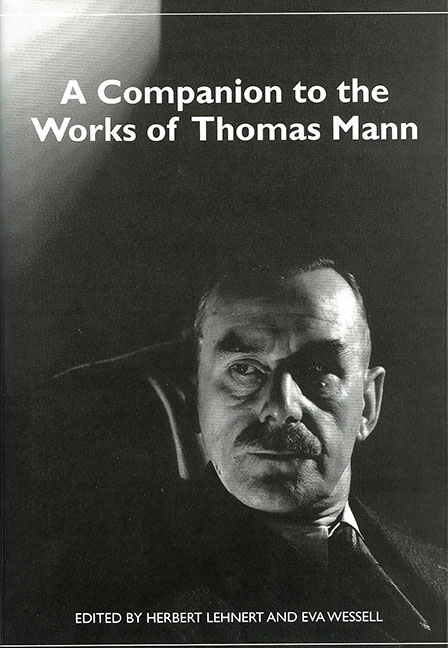Book contents
- Frontmatter
- Contents
- Foreword
- Thomas Mann's Works
- List of Abbreviations
- Introduction
- Thomas Mann's Beginnings and Buddenbrooks
- Art and Society in Thomas Mann's Early Novellas
- Love in Society: Thomas Mann's Early Stories
- “Death in Venice”
- “Mein ‘Friedrich’ — das ist was Anderes”: Thomas Mann's Unwritten Novel about Frederick the Great, King of Prussia
- Magic and Reflections: Thomas Mann's The Magic Mountain and His War Essays
- Thomas Mann's “Autobiographical” Stories
- Joseph and His Brothers
- Lotte in Weimar
- Thomas Mann's Late Politics
- “German” Music and German Catastrophe: A Re-Reading of Doktor Faustus
- The Gaze of Love, Longing, and Desire in Thomas Mann's “The Transposed Heads” and “The Black Swan”
- Felix Krull
- Female Identities and Autobiographical Impulses in Thomas Mann's Work
- Betrayed or Not Betrayed: A Testament?
- Thomas Mann's Comedies
- Notes on the Contributors
- Select Bibliography
- Index
Lotte in Weimar
Published online by Cambridge University Press: 28 April 2017
- Frontmatter
- Contents
- Foreword
- Thomas Mann's Works
- List of Abbreviations
- Introduction
- Thomas Mann's Beginnings and Buddenbrooks
- Art and Society in Thomas Mann's Early Novellas
- Love in Society: Thomas Mann's Early Stories
- “Death in Venice”
- “Mein ‘Friedrich’ — das ist was Anderes”: Thomas Mann's Unwritten Novel about Frederick the Great, King of Prussia
- Magic and Reflections: Thomas Mann's The Magic Mountain and His War Essays
- Thomas Mann's “Autobiographical” Stories
- Joseph and His Brothers
- Lotte in Weimar
- Thomas Mann's Late Politics
- “German” Music and German Catastrophe: A Re-Reading of Doktor Faustus
- The Gaze of Love, Longing, and Desire in Thomas Mann's “The Transposed Heads” and “The Black Swan”
- Felix Krull
- Female Identities and Autobiographical Impulses in Thomas Mann's Work
- Betrayed or Not Betrayed: A Testament?
- Thomas Mann's Comedies
- Notes on the Contributors
- Select Bibliography
- Index
Summary
Charlotte Kestner
In the fall of 1816, a matron, well into her sixties and accompanied by her grown daughter, set out on a journey from Hanover to Weimar in order to visit her sister. During her stay of a few weeks in Weimar, she also had lunch with Goethe; soon after this she departed for her hometown, as unnoticed as when she had arrived. Her visit has left few traces in intellectual history. It would have completely vanished from memory had the visitor not been a certain Hofrätin Kestner, who, forty-four years earlier as Lotte Buff, had been the object of the young Goethe's passion. As such she was one of the external and internal causes responsible for the first bestseller in German literature, Die Leiden des jungen Werthers (1774). However, the reappearance of the former beloved and muse seems to have done little to impress the elderly gentleman, now a famous writer and Minister of State. With two unremarkable entries in the Annalen (1830) and in his diary, Goethe saved himself and the world any further commentary: “Hofrätin Kestner aus Hannover,” reports the one, “Mittags Ridels und Mad. Kästner [sic] von Hannover,” reads the second.
These laconic notations, however, were not the seed from which Thomas Mann developed the “bookworthy event” of his novel Lotte in Weimar (The Beloved Returns, 1939). The material had already been treated by someone else when Thomas Mann first laid eyes on it, and it had been treated in such a way that the novelist's instincts were aroused. In March 1935, when Thomas Mann decided to embark on his “Arbeitsplan Goethe-Lotte Kestner,” he remembered, probably not for the first time, Felix A. Theilhaber's book, Goethe. Sexus und Eros (1929). In Theilhaber's book, this “Vorfallenheit,” as Mann's Goethe calls the event of Lotte's visit (GW 2, 685), appears to have been a psychologically fine-tuned idea or even as an “unheard of event” ready-made for the author Thomas Mann looking for inspiration. Theilhaber quotes the story of the reunion of Goethe and Charlotte Kestner as written by a certain Ludwig Häberlin in the nineteenth century.
- Type
- Chapter
- Information
- A Companion to the Works of Thomas Mann , pp. 181 - 202Publisher: Boydell & BrewerPrint publication year: 2004

